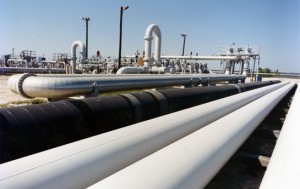94 item(s) were returned.
Energy independence has been a goal of the United States since the oil crisis of the 1970s. And while 2019 saw record domestic oil production, the United States was still a net importer of oil with net imports totaling $192 billion. In an OurEnergyPolicy webinar on June 24, 2020, Yossie Hollander—Co-Founder and Chairman of The Fuel Freedom Foundation—discussed energy independence and current efforts to achieve it. He explained how in today’s interconnected world, reducing U.S. dependence on global oil prices requires more than just increasing domestic oil production. To make energy (oil) independence a reality, we need a broader approach… [more]
View InsightInternational Climate Advocate, Global Advocacy, International Program
Natural Resources Defense Council
The use of fossil fuels drives climate change. Unfortunately, the path to clean sources of electricity, heat, and transport is impeded by the continued government subsidization of fossil fuels. In our recent Scorecard measuring the US against other G7 countries on progress in eliminating fossil fuel subsidies, the US ranked last, spending over $26 billion a year to prop up fossil fuels. Fossil fuel subsidies waste money and come at the expense of public health, local communities, and the climate. The US still provides subsidies for fossil fuel exploration, mining, production, and consumption. The US subsidizes more oil and gas… [more]
View InsightMPP Candidate
George Washington University
In January, the Bureau of Ocean Energy Management (BOEM) released its “America-First Offshore Energy Strategy,” as part of the 2019-2024 National OCS Oil and Gas Leasing Draft Proposal Program (DPP). While the Obama Administration’s 2017-2022 program opened up only 6% of total outer continental shelf (OCS) acreage to resource exploration and development, the 2019-2024 Program proposes to open up approximately 90%. The BOEM estimates the U.S. OCS has about 90 billion barrels of undiscovered oil and 327 trillion cubic feet of undiscovered, natural gas. If implemented, the 2019-2024 DPP would dramatically expand America’s capacity for offshore oil and gas drilling,… [more]
View InsightThe U.S. currently maintains one of the world’s largest stockpiles of government owned oil, the Strategic Petroleum Reserve (SPR). In response to the 1970s oil embargo and supply shocks, the U.S. created the SPR to ensure access to oil in the event of a severe energy supply interruption. The current SPR consists of four storage sites, housing 694 million barrels of oil that is equivalent to at least 90 days of net oil imports. The SPR has only been tapped three times, but the recent budget deal provides that the government sell 58 million barrels of oil to fund a… [more]
View InsightCrude oil prices have dominated headlines and industry attention over the past year. In 2014 and continuing in 2015, the Organization of the Petroleum Exporting Countries (OPEC) agreed to unconstrained output for it 12 member countries, resulting in a dramatic increase in global oil supply. Meanwhile, China and Europe’s demand for oil has remained relatively steady. In addition, U.S. domestic production nearly doubled since 2008, decreasing domestic imports and leaving more oil on the global market. As a result, oil prices fell from $90 per barrel in 2014 to $46 per barrel today and projections indicate prices between $30 and $60 per barrel… [more]
View InsightEditor
Bloomberg's First Word Energy
After years of discussion and delay, the Environmental Protection Agency (EPA) is set to finalize ozone standards in the coming weeks. It’s a rule long in the making: EPA’s decision during the Bush administration to set the standard at 75 parts per billion was challenged in court by health and environmental organizations as insufficient. At the beginning of the Obama administration, the EPA said it would reconsider the standard, but that initiative was tossed out by President Obama in the lead up to 2012 election. The move summed up the discord between the president and environmentalists in his first term.… [more]
View InsightWhile the Clean Power Plan has attracted a great deal of attention in recent weeks, a number of Congressional initiatives may well be the focus of the fall legislative session. With both the House and Senate considering what would be the first comprehensive energy packages since 2007, energy promises to play a prominent role when the congressional session resumes in September. A few potential initiatives include: Senate Energy and Natural Resource (ENR) Committee: ENR passed the Energy Policy Modernization Act of 2015. The bipartisan bill includes five titles focused on Efficiency, Infrastructure, Supply, Accountability and Conservation. House Energy and Commerce… [more]
View InsightDirector of International Public Policy and Advocacy
Global Innovation Policy Center, U.S. Chamber of Commerce
In June, Shell kicked off its controversial Arctic program to conduct exploratory operations in the Chukchi Sea and the Arctic Ocean. Shell plans to drill two wells beginning in August 2015, when ice clears. Shell initially purchased leases to drill in the Arctic in February 2008 from the Bush Administration’s Interior Department, leases that have been repeatedly endorsed by the Obama Administration, most recently in March 2015. The success or failure of these operations could significantly affect future efforts to explore for hydrocarbons in the region. Shell previously abandoned its Arctic exploration program in the 1990s due to high comparative… [more]
View InsightAmerican Fuel and Petrochemical Manufacturers (AFPM) represents more than 400 companies that encompass virtually all U.S. refining and petrochemical manufacturing capacity. Refiners and petrochemical manufacturers make modern life possible by using advanced technology to produce the energy and essential products that we use every day. Our members keep America moving and growing as they meet the needs of the nation, its families, businesses, and local communities, strengthening economic and national security, and supporting nearly 2 million American jobs.
View InsightLead Senior Economist
Environmental Defense Fund
What determines the cost of a ton of coal? Is OPEC an oligopoly? Should we subsidize low-carbon energy or tax fossil fuels? Do Prius owners drive more? These are among the questions I cover in my Economics of Energy class. I’ve taught this class at Columbia University’s School of International and Public Affairs for the past five years. I hope to receive your feedback on how to improve this course. The course has two goals: to provide a set of tools to approach these and many other fundamental questions in energy economics, and to do so in plain English. Last… [more]
View Insight







